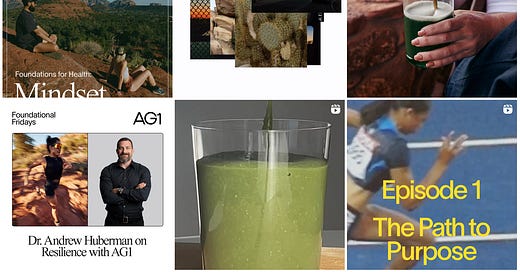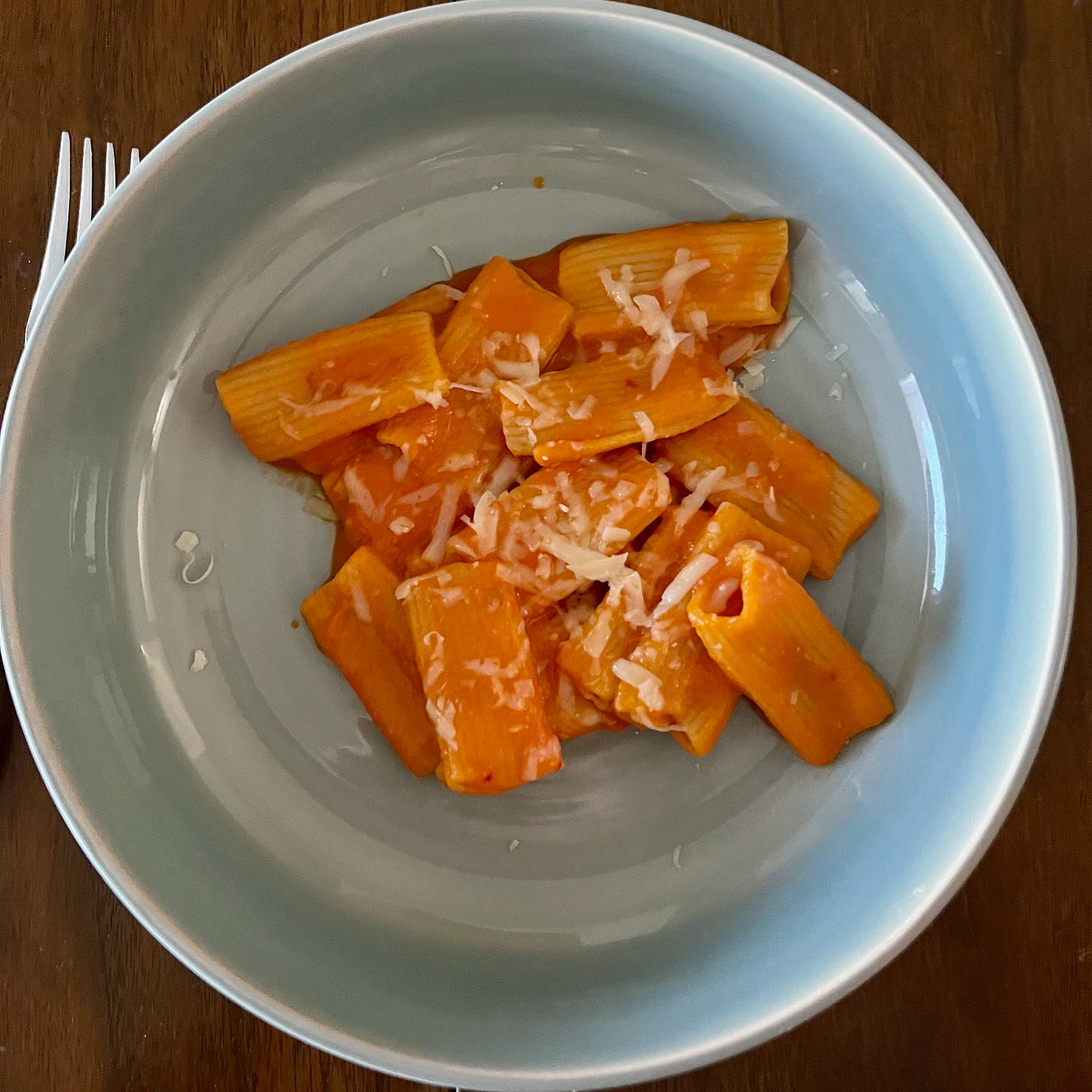Exhausted, burned out, and seeking relief in consumable form
From crushed pearls to Athletic Greens
I've been thinking about what people consume for comfort: Alcohol, fat, sugar, and the many powders of proteins, adaptogens, greens, vitamins, and minerals. We also hold things in our mouths: another's body, our own body, rocks, dirt, lies. As a toddler, I'd often keep a rock in my mouth if I was outside. My mom became so used to it that she stopped digging them out of my mouth immediately. I never swallowed a stone. Craving non-food items like soil or rocks is called "pica," a Latin word for magpie, the bird that eats almost anything.
I'm (slowly) reading Sweetness and Power: The Place of Sugar in Modern History by Sidney W. Mintz, and he writes about the wealthy in times past who consumed crushed pearls and diamonds when they were ill. In their pre-capitalist hierarchical society, it was believed the rulers were designated by God as a higher class than the poor. Therefore, the pearls, diamonds, and gemstones were rightfully theirs and only theirs. Mintz asks, "What more pointed way of dramatizing privilege than the literal bodily consumption of preciosities?"
When I first read it in the book, I laughed at those weird ancient rulers slurping down precious gemstones. But then I spied the canister of Athletic Greens in my kitchen and thought again. In January 2022, I ordered Athletic Greens after being badgered into submission by the Instagram ads. The green metal canister and spoon were beautiful as I unpacked them. Drinking the powder mixed into cold water was underwhelming. But I persisted for a while, thinking at least it couldn't hurt. I forgot to turn off the subscription, and by the time I canceled it in September 2022, I was left with four or five bags sitting in my pantry. I was behind pace, even failing at drinking this super powder. My brothers let me pawn two bags off to them. Leaving me with three bags I've been working through because I refuse to throw them away.
As I drink my green juice, I think about the great struggle of individuals within a government that doesn't care for everyone. The foolishness of being human. My desire to be strong and healthy. My struggle with time—the lack of it, and it moving so fast. And my solution to those struggles and desires—buy something! The U.S. isn't a feudal hierarchy, and we don't believe the ruling class has divine rights. All citizens are equal in theory. And yet inequalities mount: in pay, in treatment, in access to food, housing, employment, health care, the list continues. Mintz writes, "To be able to destroy—literally, by consuming it—something that others desire is not a privilege alien to contemporary life and values." It seems like the only divine right espoused by the U.S., and a sign of its modernity, is consuming more and more.
Crushed pearls or diamonds aren't easy to come by, but miracle powders there are aplenty. I searched my local conventional grocery store's website for "protein powder," and there were 1,042 results. When I changed the search term to "health powder," the results jumped to 1,962. The powders have a staggering variety of ingredients and uses. Still, most of them ingratiate themselves into our lives because they solve one problem: The average U.S. citizen's real or perceived lack of time.
How much time does putting a tablespoon of green powder into water save compared to eating some vegetables from my fridge? Is the amount of time saved disproportionately small compared to the amount of money Athletic Greens is making off my feeling of being pressed for time? Mintz: "the simultaneous control of both the foods themselves and the meanings they are made to connote can be a means to pacific domination." I may not feel like I'm being dominated by my green juice, but in a broader sense I most definitely am by the market.
Athletic Greens "saves me time" and makes me feel like I have "healthy and athletic" attributes. It is consumed quickly, usually in the morning, to get off to a "good start" or late in the day when I feel I haven't "eaten well enough." Where am I getting these messages? From the society I live in, the company itself, and their incessant and persuasive advertising. Their website copy doesn't hold back: "AG1 is Foundational Nutrition, the nutrients you need for whole body health." It hits all the buzzwords driving U.S. consumer desire and anxiety: "science-driven," "vitamins, probiotics," "whole-food," "comprehensive." They say it's a "Daily routine, made easy." They offer "the Foundational Nutrition you need with the convenience your life demands."
Mintz writes about how, when industrialization came to England, food and eating changed to work around employment routines and hours. This is when sugar consumption (mostly connected to tea and convenient pastries) began to skyrocket as workers needed more energy and had less time to get it. This period marked the beginning of the line of thinking that Athletic Greens uses. 'Convenience your life demands' should read 'Convenience your employer demands.'
In small measures, drinking the green juice brought me comfort and peace. (Although I will not be re-purchasing.) It felt like a better comfort measure than alcohol, which I don't drink in the morning—unless mimosas are involved because imbibing early in the day is proper in that setting. Mintz writes about this fluidity: "The substances and acts to which meanings attach—inside kinds of meaning—serve to validate social events. Social learning and practice relate them to one another, and to what they stand for." The meanings we derive from food are learned, social, and not universal. But it feels near universal in 2023 that people in the U.S. are exhausted, burned out, and looking for relief in consumable form.
How do people make it through the day? In an isolating society, coping mechanisms are necessary. Sometimes it's alcohol. Sometimes it's a little snack. Sometimes, it's a green powder that transforms my water into a super juice. Whatever will give us a little more energy to deal with the life we're living. This can get out of control—alcoholism is in my heritage and I watch myself carefully. But I don't fault myself or anyone for seeking comfort. And at the same time, how do we take care of ourselves in ways that minimize damage? And are we taking care of ourselves for ourselves, or so that we can continue working for The Man?
Finally, Mintz writes, "[Symbols] have no universal meaning; they "mean" because they occur in specific cultural and historical contexts, where their relevant meanings are already known to the participants." How do we make enough meaning to feel like we have purpose, matter, and belong? And what does it mean when we derive meaning from products sold to us by companies profiting from our loneliness, isolation, and exhaustion? I want true, safe comfort for everyone—especially anyone who can't remember the last time they felt at peace. Seeking better options than "buy this to feel good" and an expansive understanding of eating as a social good are part of the liberated future. There is enough time to sit, eat, and find comfort together.
Reading - Fairy and Folk Tales of Ireland compiled by W.B. Yeats. Heirloom Seeds and Their Keepers by Virginia D. Nazarea (passed on to me by a friend of the newsletter, Julia, who runs Cositas, Mother Ritual, and Eat Yema. Thank you, Julia!) The new issue of Currant Jam (featuring online writing pal Cath’s gorgeous poem.)
Writing - So many emails trying to line up writing about books coming out in 2024. (Yay!)
Cooking - Udon with peanut sauce. Stewed zucchini and canned tomatoes. Toast. Saint Pasta's vodka sauce and fresh pasta after their most recent drop, which did NOT disappoint.





